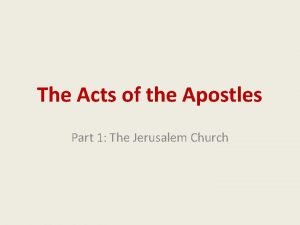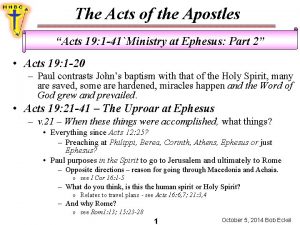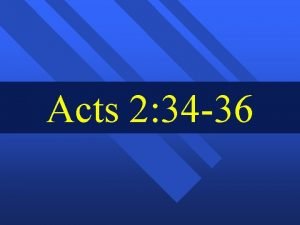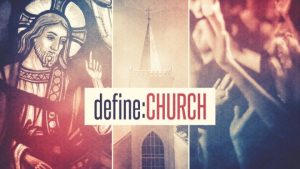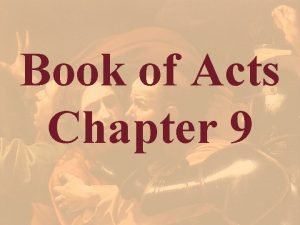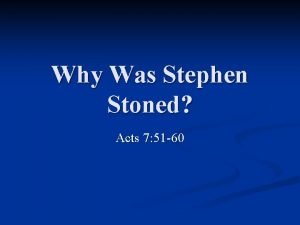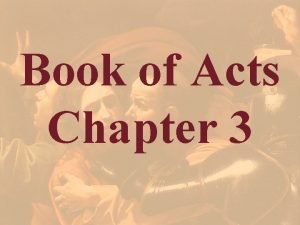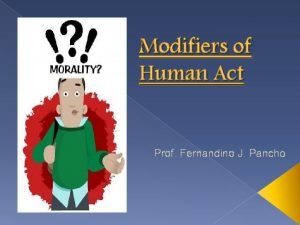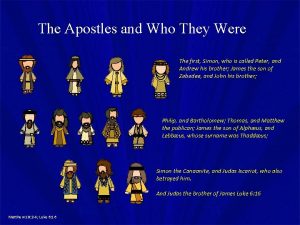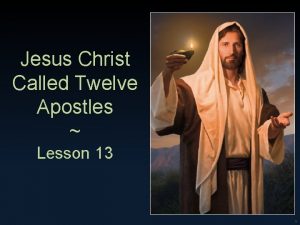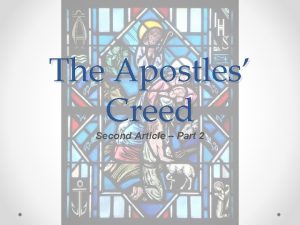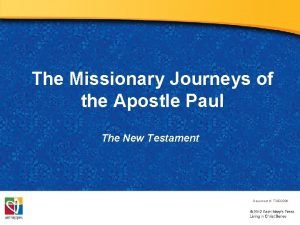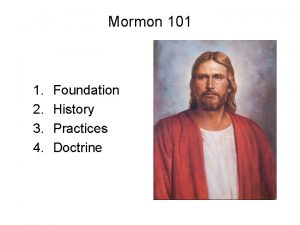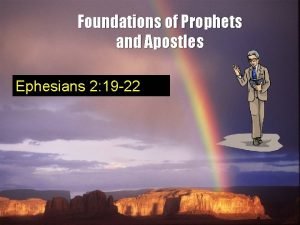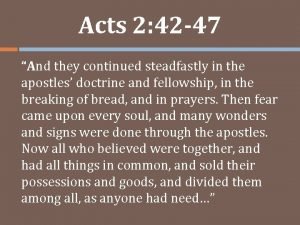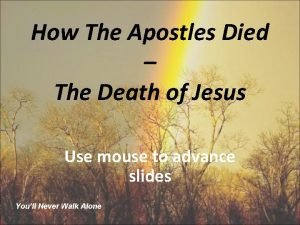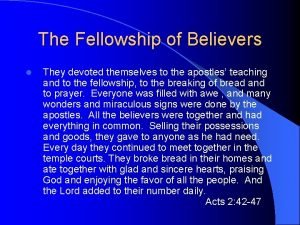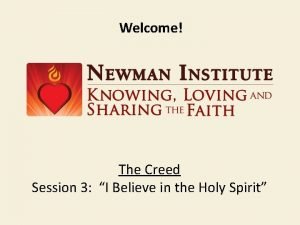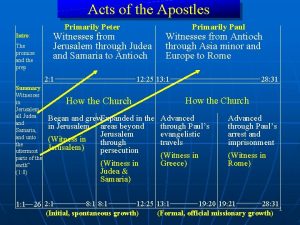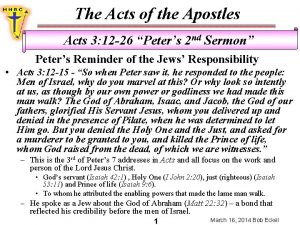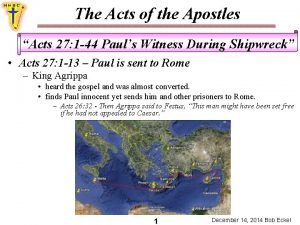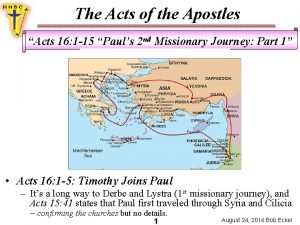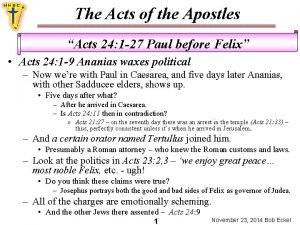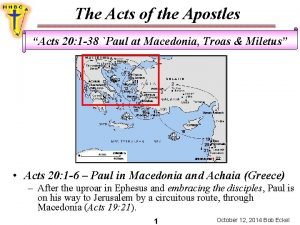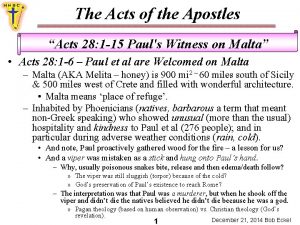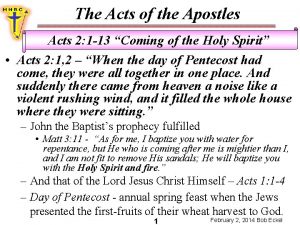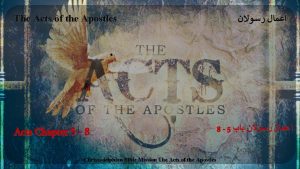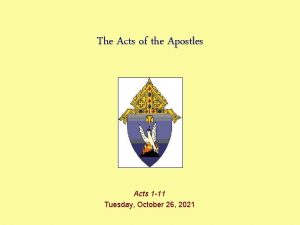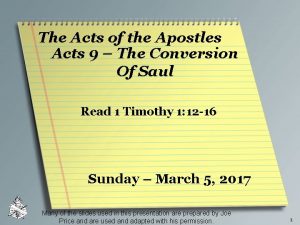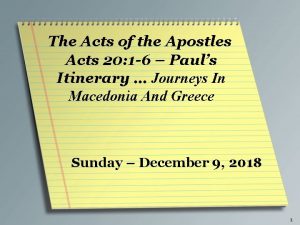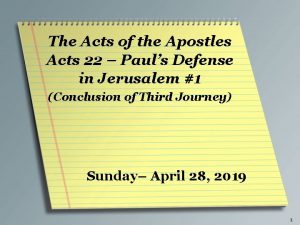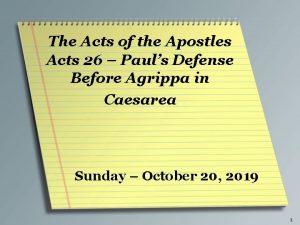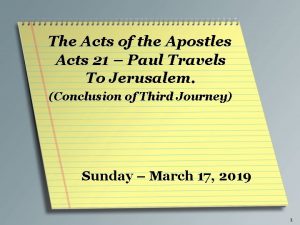The Acts of the Apostles Part 1 The
























- Slides: 24

The Acts of the Apostles Part 1: The Jerusalem Church

A Continuation of Luke’s Gospel • Also addressed to Theophilus • It’s an account of the progression from a Jewish movement to a Gentile faith. • Christianity is a legitimate religion that does not threaten the Roman government. • Many of the events involving the apostles in Acts mirror events involving Jesus in Luke. • Through the proclamation of the risen Lord, God opens the way for “all peoples” to join his flock. – Acts 10: 34 -36 “Then Peter began to speak to them: ‘I truly understand that God shows no partiality, but in every nation anyone who fears him and does what is right is acceptable to him. You know the message he sent to the people of Israel, preaching peace by Jesus Christ—he is Lord of all. ”

Key Questions You may not be able to answer each of these questions “perfectly, ” but you should be able to offer some ideas and be able to support those ideas with evidence from Acts. 1. How did a Jewish messianic movement develop into a Gentile religion? What sequences of events and ideas affected this transformation? 2. How is it that Paul, who did not know the historical Jesus, became his chief interpreter? 3. How does Acts show Jesus’ disciples, motivated by the same Sprit that had inspired Jesus, carrying his work into the Greco-Roman world. 4. Why/How does this new way appeal to the people? 5. According to Acts, what are the essential elements for becoming a believer. 6. What is Paul’s contribution to the international mission?

Acts 1: 8 An outline for the growth of “the new way” (9: 2) You will receive power when the Holy Spirit has come upon you; At Pentecost, the gift of the Holy Spirit fulfills this (2: 1 -13) and you will be my The preaching of Peter and others in witnesses in Jerusalem, Jerusalem brings about the witness there (2: 14 -8: 3) in all Judea and Samaria, Persecution in Jerusalem forces Christians out into Judea; the Samaritan mission follows (8: 4 -25) and to the ends of the earth. Less clear, but it happens in many ways. The Ethiopian comes from a long way (8: 26 -40) Cornelius is the first gentile convert (10: 1 -11: 18) Paul arrives in Rome (28: 14)


Themes • • God’s ancient promises to Israel through Abraham and Moses are fulfilled in the life and work of Jesus and his successors, who constitute a Spirit-blessed community, the true Israel. “The new way” [Christianity] is a universal means of salvation encompassing all nations, Jewish, and Gentile alike. Luke shows biblical promises being fulfilled when the Jewish disciples are empowered by the Holy Spirit at Pentecost (2: 1 -47). The author illustrates the step-by-step process by which the divine promises were extended to non-Jewish peoples, beginning with campaigns in Samaria and Syria (8: 1 -12: 25). The climactic events of this first section are the conversions of Paul, a Pharisees, and Cornelius, a Roman soldier, the first Gentile anointed by the Holy spirit.

Response to the Good News Acts 2: 38 offers four elements of the desired response to the Good News. • “Peter said to them, ‘Repent, and be baptized every one of you in the name of Jesus Christ so that your sins may be forgiven; and you will receive the gift of the Holy Spirit. ” 1. 2. 3. 4. repentance baptism the forgiveness of sins reception of the Holy Spirit

Acts 1: The end of Jesus’ ministry • Jesus promises the H. S. • The disciples’ last question – “Lord, is the time you will restore the kingdom to Israel? ” – How does Jesus respond? • He ascends – Two angels (like the ones at the tomb) say he will return in the same way. • Matthias replaces Judas

Acts 2: The Holy Spirit Comes • Disciples were obediently waiting • Happened on Pentacost (50 days after the Exodus. God gave the 10 commandments) • Spoke in many languages. – Message is for all people • • Peter’s first sermon Positive response by the people They lived communally with neither rich nor poor About 3000 joined the new movement.


Acts 3 -4: Peter and the Crippled Beggar • Follows same pattern as Jesus’ miracles. • 3: 13 Luke connects God’s action in Jesus to God’s action in all of Israel's history. • 4: 1 Luke makes a clear distinction between the people and their leaders. • 4: 13 The message is especially compelling because the speakers are uneducated but they don’t sound like it. • Leaders threaten them • Followers unite in prayer and fellowship

Jesus in Solomon’s Portico, the same area where the earliest Christians regularly met.

Acts 5 -6: Issues within the church • Fear over the situation with Ananias and Sapphira • Further persecution – Gamaliel (a Pharisee) defends the new way. • Seven set apart to serve – Like Moses needed helpers – Introduces Stephen

Acts 7: Stephen: The First Martyr • Stephen’s speech summarizes Israel’s history and places Jesus in it. • Stephen’s attitude at his death mirrors Jesus’ Luke 23 Acts 7 46 Then Jesus, crying with a loud voice, 59: Lord Jesus, receive my said, ‘Father, into your hands I spirit commend my spirit. ’ Having said this, he breathed his last. 34 Then Jesus said, ‘Father, forgive 60 Lord, do not hold this sin them; for they do not know what they against them are doing. ’




Acts 8: The word spreads • Stephen’s death stimulates further persecution. Saul is a leader in it. • Philip preaches in Samaria – Simon the Sorcerer wants to buy the H. S. • Philip and the Ethiopian Eunuch – Starting with Isaiah 53: 7 -8, Philip explains the gospel and the Ethiopian is converted and bapstized.

Acts 9: Saul’s conversion


Acts 10: Conversion of Cornelius • Peter has a dream first about unclean food made clean. • Miraculous events lead up to the conversion • Cornelius and his household receive the H. S. • Cornelius becomes the first completely Gentile full convert.

Acts 11: Church decentralized • The church was centralized in Jerusalem, but Antioch becomes a new center. • The conversion of Cornelius takes the church in a new direction. • The disciples were first called “Christians” at Antioch

Acts 12: James killed and Peter imprisoned • One of Jesus’ inner circle is killed • Peter is also imprisoned but is delivered by God’s power. • Unlike Peter, who praises God for his rescue, Herod Agrippa fails to praise God and is struck down and dies. • The movement continues to grow and exapand

Acts 13 to the end • The narrative shifts to focus around the missionary journeys of Paul.
 The acts of the apostles part 1
The acts of the apostles part 1 Acts 19:1-41
Acts 19:1-41 Acts of the apostles 2:34-37
Acts of the apostles 2:34-37 Acts of the apostles 9 1-22
Acts of the apostles 9 1-22 Acts 9
Acts 9 Acts of the apostles 7 51 60
Acts of the apostles 7 51 60 Acts 3:14
Acts 3:14 Modifiers of human acts habit examples
Modifiers of human acts habit examples Week of peace things fall apart
Week of peace things fall apart Bartholomew apostle facts
Bartholomew apostle facts Twelve points of the apostles creed
Twelve points of the apostles creed Apostles' creed chapter 1
Apostles' creed chapter 1 Lds 12 apostles in order
Lds 12 apostles in order Latin apostles creed
Latin apostles creed The missionary journeys of the apostle paul
The missionary journeys of the apostle paul The 13 apostles
The 13 apostles 12 apostles
12 apostles Foundation of apostles and prophets
Foundation of apostles and prophets Acts 2 42 47
Acts 2 42 47 How jesus apostles died
How jesus apostles died The apostles creed prayer
The apostles creed prayer They devoted themselves to the apostles teaching
They devoted themselves to the apostles teaching The churches the apostles left behind
The churches the apostles left behind Apostles astd
Apostles astd What is difference between apostles creed and nicene creed?
What is difference between apostles creed and nicene creed?
